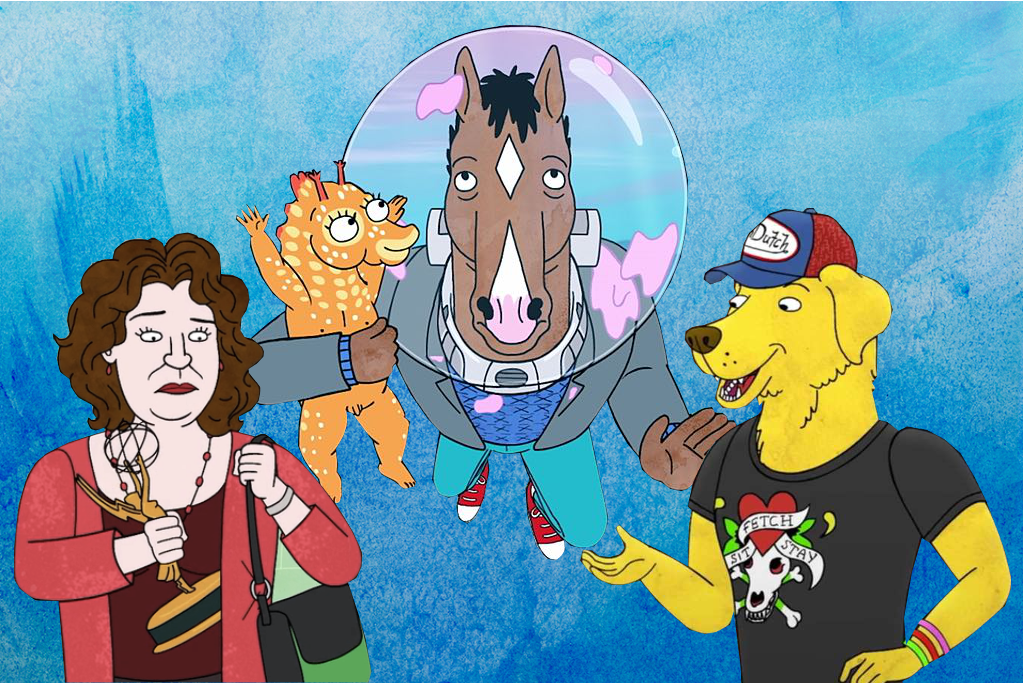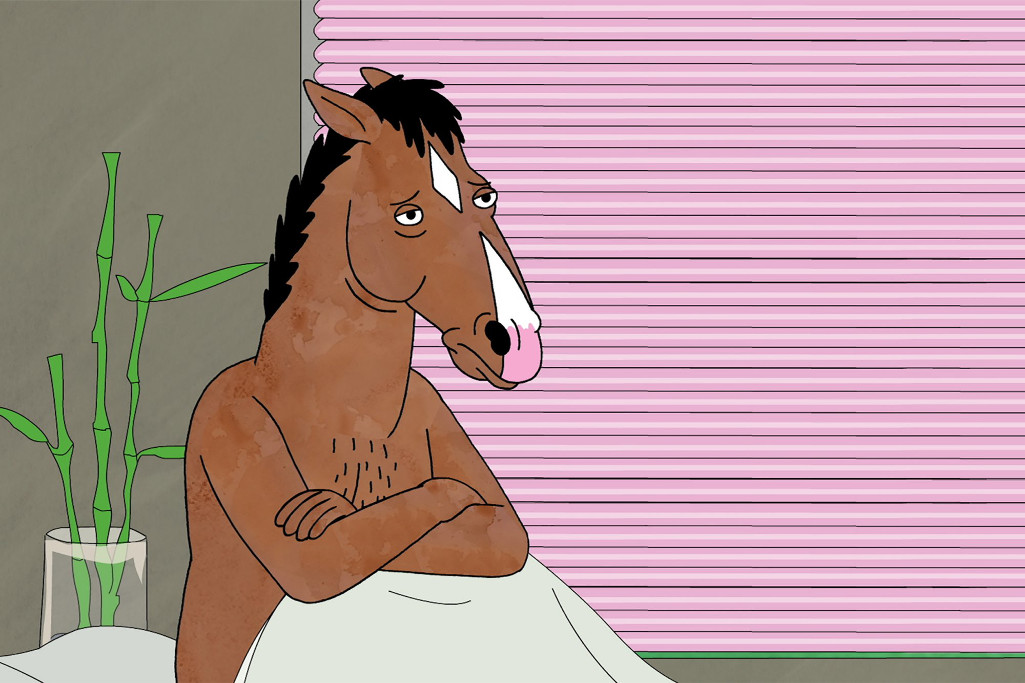The Slow Redemption Of BoJack Horseman
Is this the most harrowing season yet?
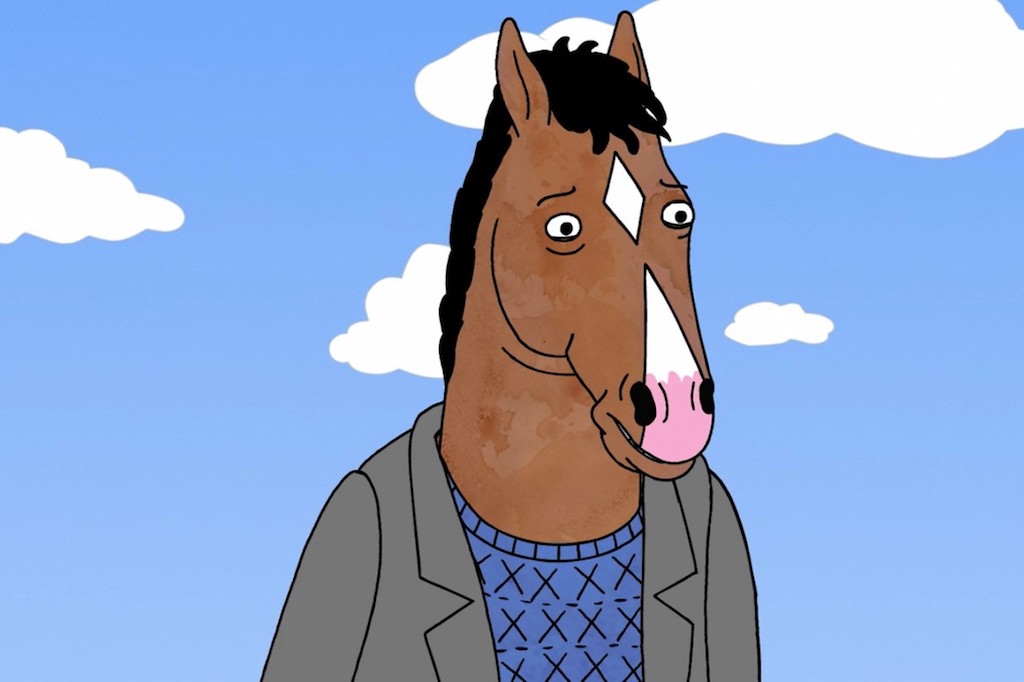
In an interview with Junkee this year, BoJack Horseman creator Raphael Bob-Waksberg hinted of the troubled titular character’s future: “You might be surprised by a moment of grace or redemption”.
BoJack is a show about fractures: the ones in our intimate relationships, our friendships, ourselves. Since the show started in 2014, we’ve gotten to know BoJack himself: a washed-up alcoholic actor who is deeply self-loathing and narcissistic, selfish and self-destructive. But, despite his many transgressions, we also can’t help but root for him. In BoJack, we see our own darkness.
It’s not a neat or easy narrative, but the show’s recently released fourth season sees BoJack inching closer to becoming a better man. There are no love interests this season, no womanising — instead, the women in BoJack’s life are his mother and a long-lost relative. The focus has shifted, and BoJack’s story suddenly isn’t so self-serving.
In past seasons, viewers have glimpsed windows into BoJack’s bleak childhood — hints at the neglect he suffered at the hands of his abusive parents that shaped him into a damaged man. As BoJack’s mother Beatrice Sugarman tells her son in season two: “You come by it honestly, the ugliness inside you. You were born broken, that’s your birthright… You’re BoJack Horseman. There’s no cure for that.”
What BoJack has always done exceptionally well is painting holistic, multifaceted pictures of villains and eliciting empathy for them, while not absolving them of responsibility for their actions. We’ve seen this done for BoJack himself over the last three seasons, but this time, it’s Beatrice we get to know intimately. It’s some of the most harrowing, honest television — animated or otherwise — in recent years.
A Family Affair
The arrival of 17-year-old Hollyhock — a horse-girl who thinks BoJack might be her biological father — is the impetus for BoJack to get back in touch with his estranged mother early on in season four. When we see Beatrice again, she has visibly aged and is suffering from dementia. She has a strange attachment to a toy doll, and refers to BoJack as “Henrietta” for reasons that become clear later on (no spoilers for the season’s biggest reveal, but it’s a doozy).
The family’s history is depicted both through flashbacks and an abstract patchwork blending past and present in a unique, arresting way. When BoJack visits the family home in Michigan as an escape, he wanders through scenes from the past playing out as if in present day. It fills us in and draws clever parallels between BoJack’s family history and his current life. We can literally see the lasting, cyclical effects of intergenerational trauma and abuse.
As we see Beatrice’s deteriorating state in the current-day narrative, we also see her childhood trauma at the hands of her cruel patriarch father and once-vivacious mother whose grief for her dead son is treated by lobotomy. The heartbreaking penultimate episode, ‘Time’s Arrow’, details her difficult relationship with BoJack’s father through the fractured prism of her decaying mind — characters from her life illustrated as literally faceless.
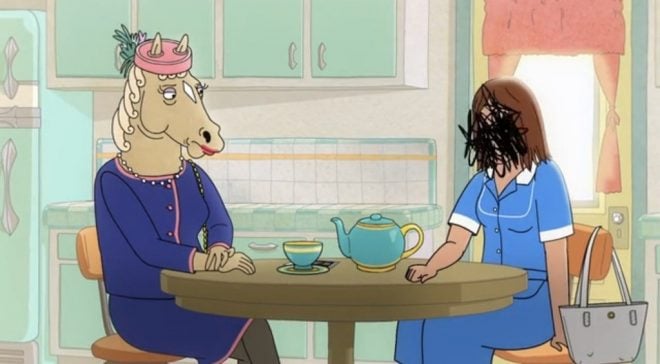
These scenes don’t romanticise dementia in the way that past depictions, like The Notebook, have – instead, they provide a sensitive, yet horrifyingly accurate look into the degenerative nature of the illness.
It’s confronting viewing, excruciatingly detailed with recurring motifs. We are given snatches of the human side of Beatrice Sugarman — in her youth a brilliantly bright feminist ahead of her time, before the men in her life both failed and broke her. She transcends the one-dimensional caricature of past seasons to become a whole character, flawed, tragic and real. The show doesn’t look to absolve her. Rather, the careful, considered storytelling implies that there are no straight answers (or correct reactions) to something so monstrous and intricate.
The introduction of Hollyhock — the show’s most dynamic new character — sees BoJack actively fighting against this continuing cycle with her. She already has eight polyamorous gay dads, but he knows that she needs him too. BoJack battles with his own self-loathing while trying to ensure that he can be what she needs. It’s a selflessness we’ve never seen from him before. We root for his redemption because it facilitates hers too. The fractures have started in her, but it’s not too late.
For the first time, we’re left with a cliffhanger that’s surprisingly positive.
Each season of BoJack contains only one utterance of the word “fuck”. It’s a choice from the writers to ensure the word carries a certain weight. In the past, we’ve heard it from Herb Kazzaz, Charlotte Moore and Todd Chavez, all directed towards BoJack in response to his selfish actions. This season, it happens so quickly, so nonchalantly, that we barely even notice it. It’s uttered by BoJack himself in a conversation with Hollyhock, dreaming of the vengeful moment he gets to spit it in his mother’s face.
But during her one lucid instant, her son acts surprisingly differently. It becomes a moment of grace. For the first time, the writers use the word to signal not an ending, but a beginning.
It’s delicate and unexpected, the way it unfolds. It hurts, and it heals. The fractures are in all of us.
The Light and Shadow
BoJack’s creators have never shied away from experimenting with form. Season three’s ‘Fish Out of Water’ was a creative tour de force, taking place entirely underwater with no dialogue. This season, they play around with illustration styles — from the aforementioned blankness of dementia, to crude animated illustrations depicting the primal nature of BoJack’s depression, to Angela Anaconda-esque cut-and-paste animations.
The concept of time is again manipulated masterfully in the excellent ‘Ruthie’, an episode narrated by a distant descendent of Princess Carolyn with a devastating twist revealed in its final moments. Strangely, the manic abstraction of these creative choices is what allows them to make perfect sense.
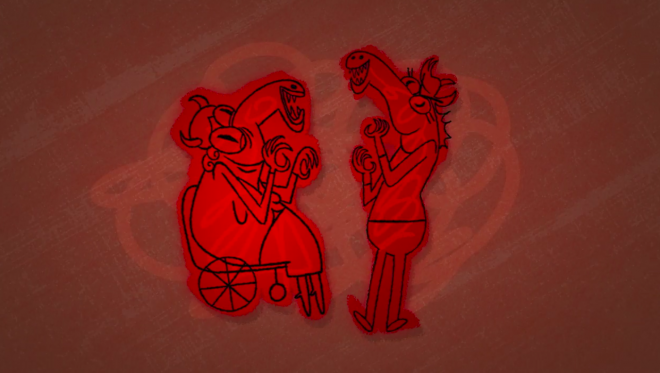
In typical BoJack form, the season is flush with visual gags, ridiculous tongue twisters to rival Arrested Development’s Bob Loblaw, an impressive array of cameos (RuPaul as a feisty ant queen is a highlight) and a gloriously batshit underground bottle episode.
It also delivers short, stinging critiques on the state of the world today — from Princess Carolyn and Ralph’s interspecies relationship and his family’s casual prejudice towards cats, to a hilarious scene about gentrification, to the dopey Mr Peanutbutter’s foray into politics (no prizes for guessing which celebrity-turned-‘politician’ is being lampooned), to the brilliant ‘Thoughts and Prayers’, a cutting satire of both America’s gun crisis and its treatment of women’s rights.
BoJack is one of the most gutting shows on TV, but also one of the smartest, funniest and silliest. That balance — the light and shadow — is what makes it essential, and this season might be the show’s most ambitious and nuanced yet. We see great strides in BoJack’s character as he begins to take responsibility for his life, and we are forced to navigate through the murky waters of trauma and face the ugly, complex reality of it all.
For the first time, we’re left with a cliffhanger that’s surprisingly positive. We don’t know what lies ahead for our antihero, but we’re given the feeling that finally, it might be something good.
–
BoJack Horseman is on Netflix now.
–
Giselle Au-Nhien Nguyen is a Vietnamese-Australian writer based in Melbourne. She has been a regular columnist for Daily Life and has also written for frankie, Rookie, BuzzFeed, Scum, The Lifted Brow and more. She tweets at @gisellenguyen.

